Can you imagine a world without cows? Think about dairy alone. There would be no more dairy milk or cheeses, yogurts, kefirs, ice cream, wait… no more ICE CREAM!
OK, it’s time to start giving cows the respect they deserve, and what better way to do that than by giving them some tasty treats from time to time? It turns out that cows love to eat some types of fresh fruits, but what about apples?
Can a cow eat apples?
Cows can eat apples in moderation. They are the perfect treat to keep your cows happy while giving them a healthy boost.
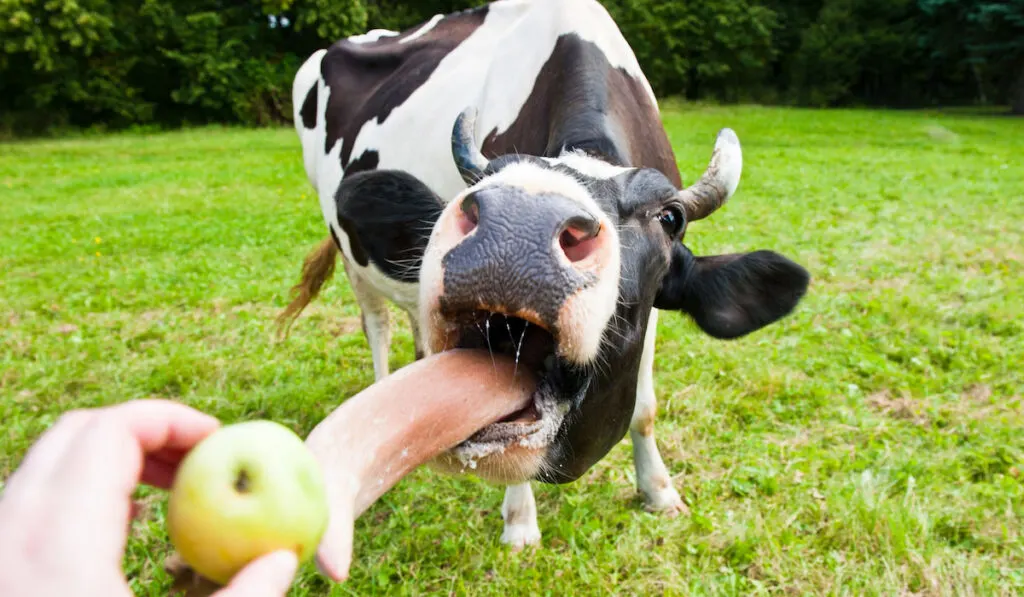
Rich in nutrients like potassium, antioxidants, vitamin C, and fiber, apples are a great option any time of the year.
From their health benefits to their negative effects, keep reading to find out more about the dos and don’ts of cows and apples.
Table of Contents
What Do Cows Eat?
Because cows are grazing animals, their diet mainly consists of grasses, hay, legumes, clover, and alfalfa. However, providing your cows access to several types of fodder is the most effective way to guarantee they eat a healthy diet.
Grass
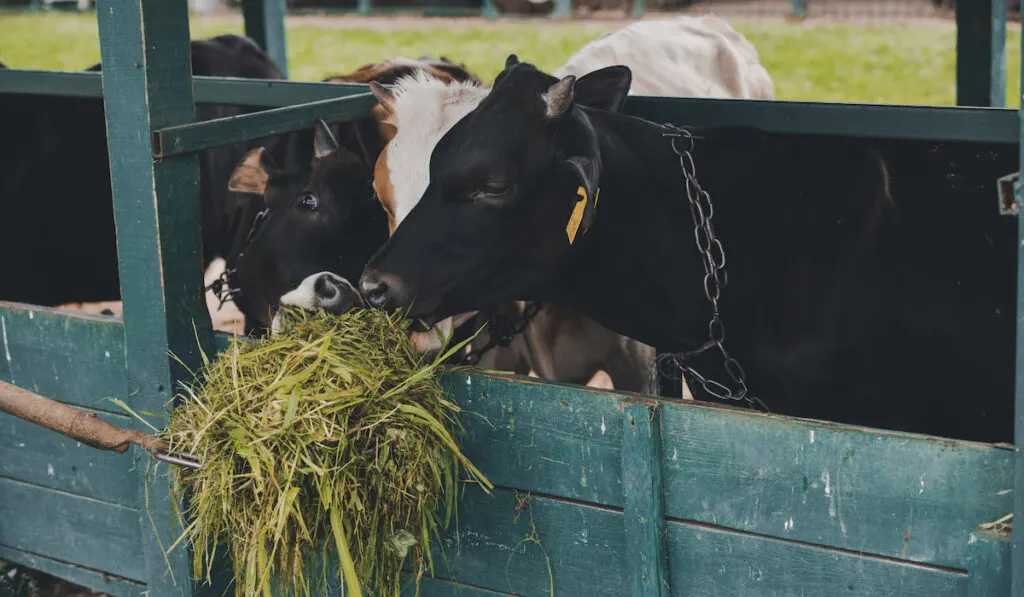
Depending on your climate, the ideal grass for cows to eat is either warm-season or cool-season perennial grass.
In hotter climates, Bermuda grass and Bahia grass perform well. For those in cooler climates, orchard grass, tall fescue, and perennial ryegrass are all great options. You should also seed the cow pasture with clover, peas, alfalfa, and grass.
Cows on high-quality pasture grass benefit both nutritionally and economically.
Hay
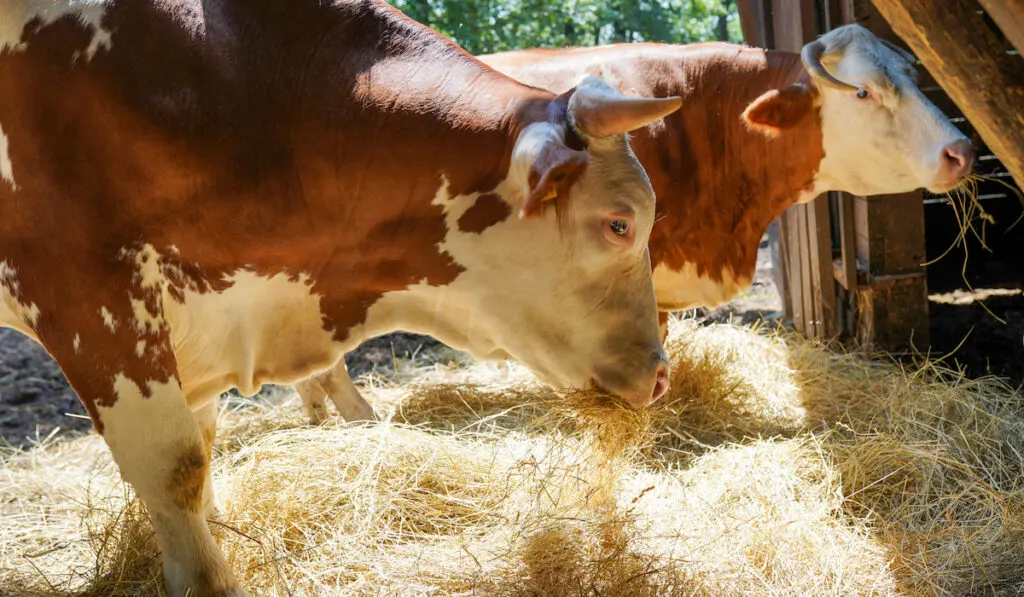
Hay is basically dried grass used to feed ruminant animals like cows.
When there isn’t enough grass for grazing, like in the winter or during a drought, hay is an alternative livestock nutrition source.
Before being cut, hayfields are seeded with a variety of alfalfa, clover, timothy, ryegrass, fescue, and other plants.
There are many different kinds of hay for cattle, but grass hay, legume hay, timothy hay, triticale hay, oat hay, and alfalfa are the most popular and nutritious.
Grain
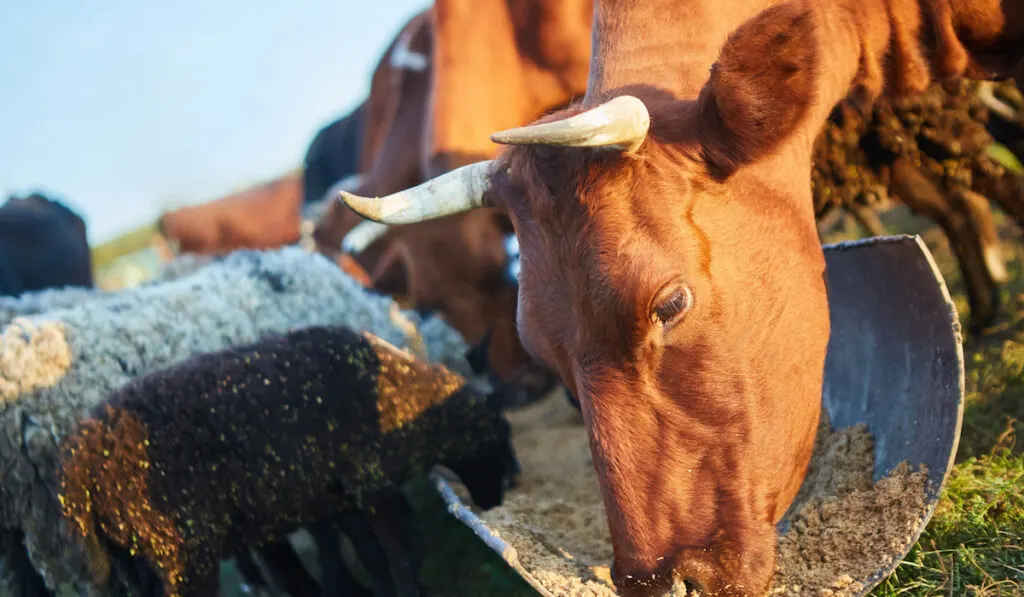
Regarding primary grains, cows are mostly fed corn, oats, and barley. Given their high fiber content, oats are considered the “safest” for avoiding digestive problems while providing adequate nutrition.
Wheat and rye are added to the diet when the price is right, but rye is usually less tasty than other grains, and wheat should be served in modest amounts or mixed with oats or corn to reduce stomach issues.
Legumes
In addition to a cow feeding plan, legumes can enhance animal performance. They can improve the nutritional content of grass pastures and reduce the requirement for additional nitrogen fertilizer.
Although sweet clover, white clover, red clover, and alsike clover are all quite popular, alfalfa is by far the most often utilized forage legume.
But be careful; overeating legume forage will leave your cattle feeling bloated due to its lack of fiber.
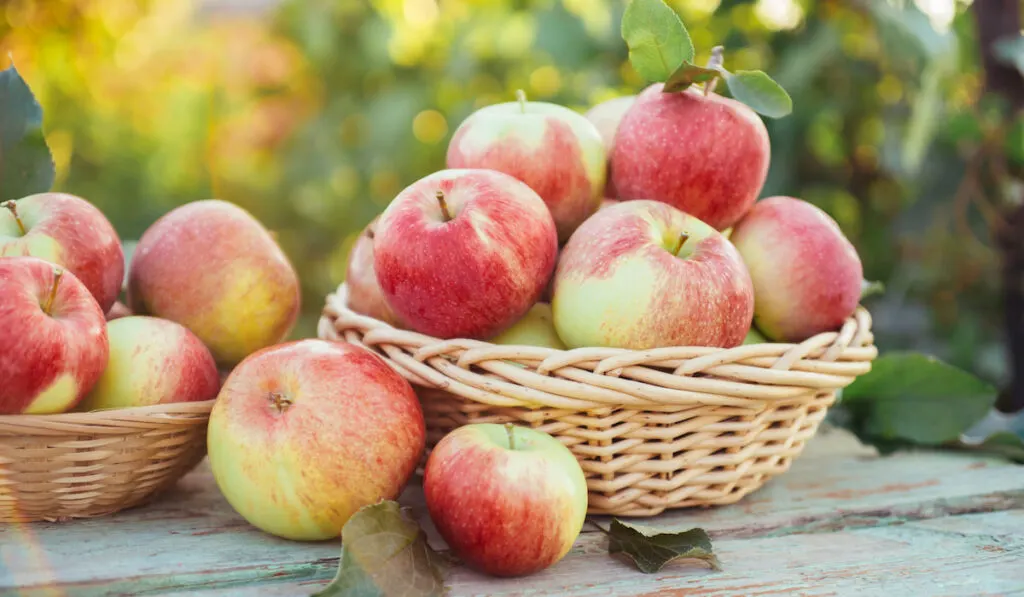
The Nutritional Breakdown of Apples
Apples have a significant share of the fruit market due to their popularity. When it comes to apples, it is always a win-win situation because they are easily accessible and affordable. And, of course, they’re tasty, juicy, and healthy.
Nutritionally, there is not much difference between red apples, green apples, and other apple varieties.
All apples are a great source of many different nutrients, including antioxidants, vitamins, dietary fiber, and more. They may enhance health in various ways due to their diverse nutrient compositions.
The United States Department of Agriculture (USDA) states that a medium-sized apple is low in calories and sugar and contains 4.8 grams of fiber. Apples also have a lot of vitamin C (9.2 milligrams), which makes them an excellent choice for a healthy snack.
Additionally, apples include several antioxidants that help fight free radicals. When too many free radicals exist in the body, cells can get damaged, and diseases like cancer can develop.
The nutritional breakdown of apples is as follows:
- Calories: 104
- Fat: 0.3g
- Sodium: 2mg
- Carbohydrates: 27.6g
- Fiber: 4.8g
- Sugars: 20.8g
- Protein: 0.5g
- Potassium: 214mg
- Vitamin C: 9.2mg
- Vitamin A: 6mcg
While it is safe to feed cows apples, they should never be a substitute for their normal daily feed. But because of their high nutritional value, apples are a very welcome and tasty treat.
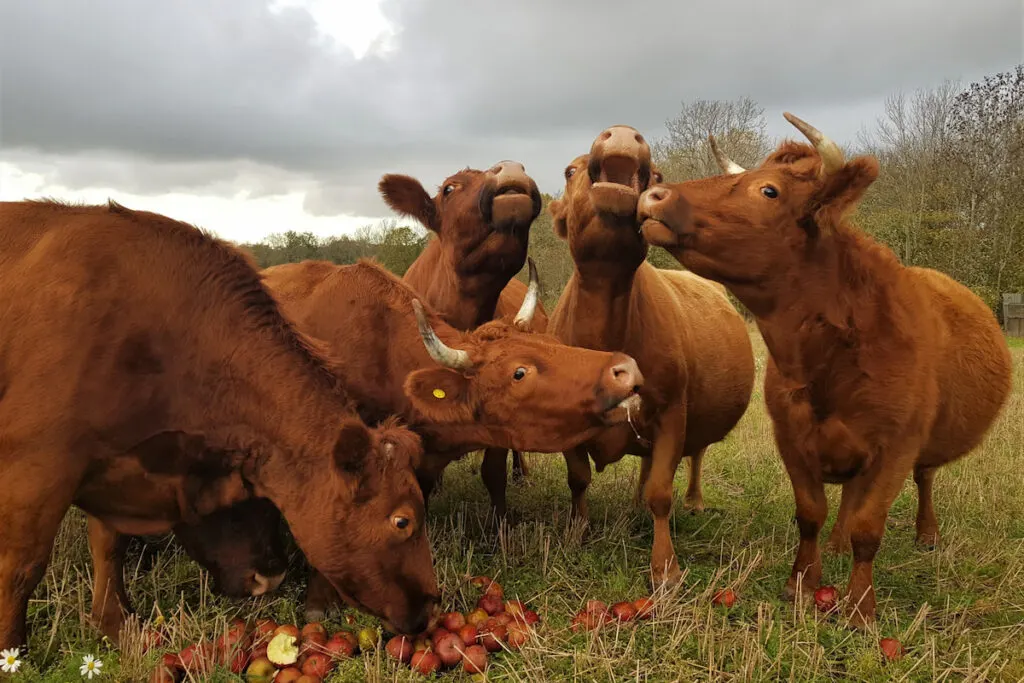
How Your Cows Will Benefit From Apple Treats?
Apples Can Help With Milk Production
Apples provide a variety of beneficial nutrients, including vitamins A and C, as well as iron, folate, and calcium. The mother cow or milk-producing cow needs a plentiful supply of these nutrients because of their specific roles.
Weak bones and decreased milk supply are both symptoms of calcium deficiency.
Cows that eat apples may produce 20% to 30% more milk than those fed an apple-free diet. Moreover, the milk produced is of higher quality due to its increased levels of nutrients and proteins.
Possible Bone-Health Benefits
If you feed your cows apples, they are less likely to get osteoporosis, a disease that weakens bone tissue and makes fractures more likely.
Apples benefit bone health because of the vitamins and minerals they contain, particularly vitamin C and potassium, which work together to stop cows from losing as much calcium through their urine.
May Stop the Damage From Free Radicals
Apples are high in polyphenols, which are antioxidant-rich plant compounds.
Polyphenols have been shown to protect cells from damage caused by free radicals. They may also help prevent diseases and health problems like:
- Cancer
- Heart diseases
- Eye diseases
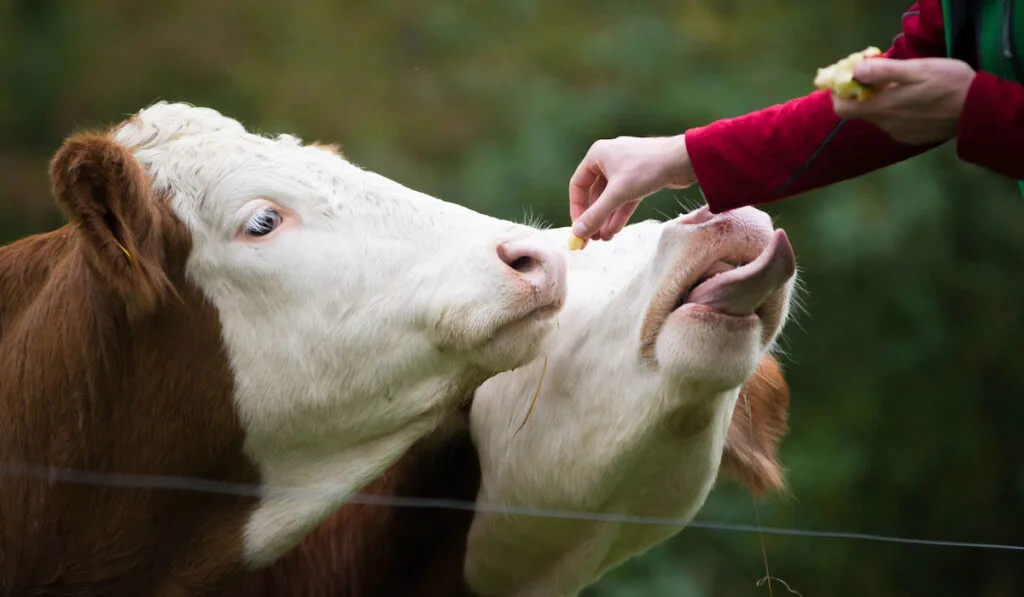
Apples Are Great for the Immune System
Remember the old saying, “an apple a day keeps the doctor away”?
People have known for a long time that apples and other fruits can help strengthen the immune system, which in turn protects against diseases like the flu. Apples are just as good for cows as they are for people.
Apple peels contain a flavonoid called quercetin, which can improve the immune system and reduce inflammation.
Prebiotics in Apples Support the Good Gut Bacteria
Pectin, found in apples, is a prebiotic fiber. Fruits with pectin feed the good bacteria that are already in the cow’s gut, which is called the gut microbiota.
Apples Aid With Digestion and Bowel Control
A single apple (with the peel) has about 4.5 grams of fiber and includes both soluble and insoluble fiber.
When mixed with water, soluble fiber forms a gel-like substance that slows digestion and helps stop diarrhea.
Insoluble fiber prevents constipation by adding bulk to poop and encouraging regular bowel movements.
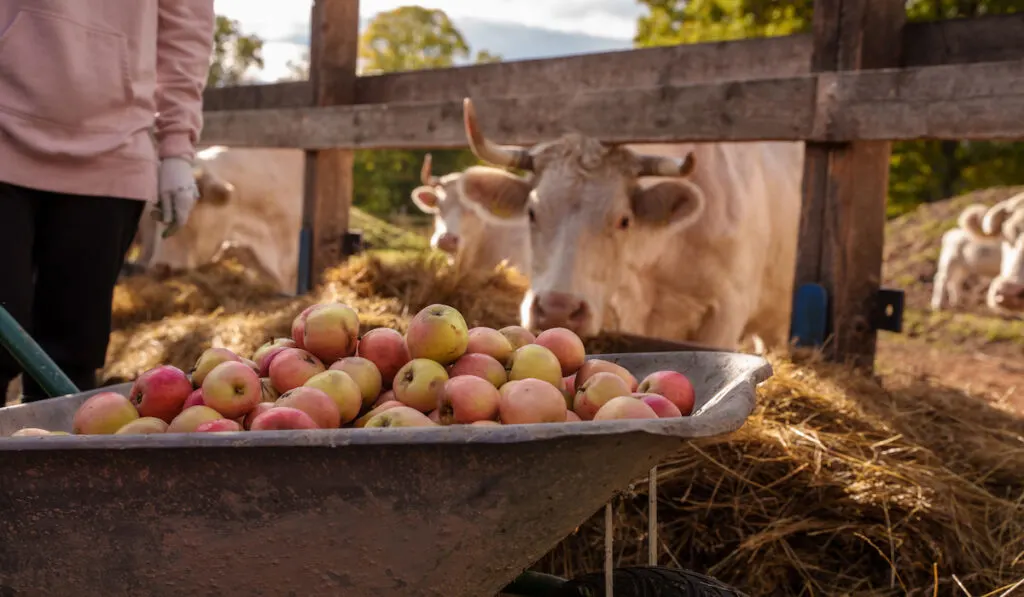
How Many Apples Can a Cow Eat?
Because of their grazing behavior, cows do best when their diet consists primarily of grass and other similar plant materials. It’s unfortunate, but sometimes the grass doesn’t have enough of the proper nutrients for the cows to thrive.
Cows’ regular diets can benefit from some good treats.
Apples are nutritious snacks, and many cows seem to enjoy them. Cows can be fed between 40 and 60 pounds (18 and 27 kilograms) per day.
But remember that giving cows too many treats, like fruits and vegetables, could make them bloated.
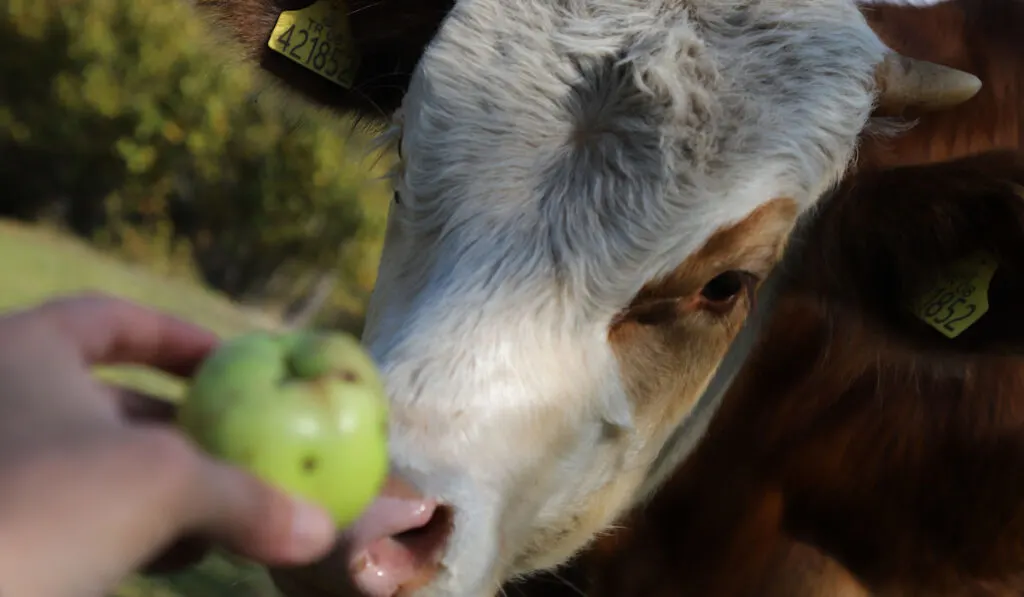
Tips on How to Feed Cows With Apples
You should pay attention to a few guidelines for safely feeding your cows goodies like fruits or vegetables to reduce the risk of harm and maximize the benefits.
Several things can be done to enhance the apple-eating experience for your cow.
- First, you should feed the cows what they normally eat: hay, grass, or grains.
- Cows can enjoy apples as part of a healthy diet, but they should never be given fruit in place of their regular rations.
- Cleaning apples thoroughly will help them keep their original flavor and nutritional value.
- Feed in moderation
- To prevent cows from choking, apples should be chopped or crushed before being fed
- Feeding cows apples that have fallen from trees or even apples that have started to ferment can help stop them from getting gassy or bloated
- Your cattle will thrive on organic, disease-free apples
Final Thoughts
Giving your cow apples is completely fine, but only as a treat and in moderation. If your cows are getting enough grass, hay, and grains in their diet, you shouldn’t have to worry about them.
Apples are a super-healthy fruit that contributes to many positive outcomes.
They have many healthy nutrients, including fiber and antioxidants, and have a lot of soluble fiber, like pectin, which aids digestion and boosts the immune system.
Apples can also help boost milk production in cows, and the milk that is thus produced is of higher quality because of the additional nutrients they provide.
Resources
- https://journals.lww.com/nutritiontodayonline/fulltext/2020/11000/a_world_without_cows__imagine_waking_up_one_day_to.7.aspx
- https://www.midwestdairy.com/farm-life/farm-life-faq/
- https://animalqueries.com/cow-hay/
- https://www.ndsu.edu/agriculture/ag-hub/ag-topics/livestock/beef/feeding-grain-stock-cows
- https://u.osu.edu/beef/2017/04/05/should-i-add-more-legumes-to-my-pasture/
- https://agtech.folio3.com/blogs/how-much-does-a-cow-weigh/
- https://www.agproud.com/articles/23451-make-sure-cows-get-enough-early-lactation-potassium
- https://www.healthline.com/nutrition/10-health-benefits-of-apples
- https://www.ncbi.nlm.nih.gov/pmc/articles/PMC8145694/
- https://www.medicalnewstoday.com/articles/267290#benefits
- https://farmandchill.com/can-cows-eat-bananas-and-apples/
- https://fdc.nal.usda.gov/fdc-app.html#/food-details/1102644/nutrients
- https://www.dairyglobal.net/health-and-nutrition/nutrition/benefits-of-vitamin-b-for-dairy-cows/
- http://www.positiveaction.info/pdfs/articles/dt17_4p27.pdf
- https://www.insider.com/guides/health/diet-nutrition/benefits-of-apples
- https://consort-design.com/can-cows-eat-apples/#google_vignette
